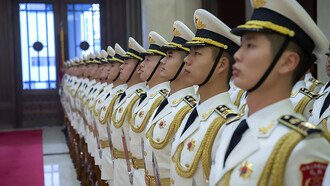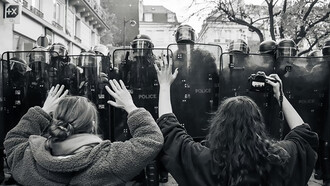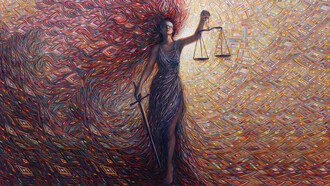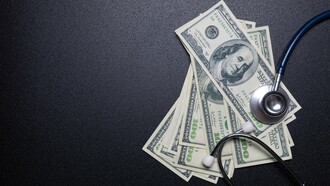Those who have seized enormous power and influence believe that only the strongest survive and that they have the right to rule our lives. The 'elite' are the richest, most powerful, best-educated, or best-trained groups in society. The dominant groups are hegemonic, and they are the most privileged and are in control of the resources, jobs, and power influence in society. The 'global elite' is used as an easy label to denote the small cosmopolitan group of the most influential businessmen, politicians, bureaucrats, and opinion-makers. So, the 'global elite' comprises individuals from various countries who meet on different continents and influence world politics.
Highlighting the role of business (capitalist elites) and the powerful social groups shapes important worldwide developments, and even globalization was caused by concrete political decisions. Globalization is said to be produced by forces of Western modernity, particularly capitalism, rationalism, and technology. The global elite in neo-liberal perspectives generally prioritizes economic material prosperity over security. This 'economism' is a more desirable goal than a country's military status, political prestige, or cultural self-determination. Obviously, they represent a powerful social group (class) that repeatedly promotes its own cause.
For example, transnational business agendas have been shaping all post-Cold War U.S. grand strategies of 'Open Door Imperialism' regardless of the actual administration in office. Or, corporate (industrial) interests have managed to influence EU governance and discourse and played an important role in completing the internal market. Neoliberals emphasize the global interconnectedness (complex interdependence) of almost all states, societies, and markets and believe that nation-states are increasingly challenged by various transnational processes. So, neoliberal theory stresses the role of international relations and multilateral interactions, flows of information, people, and goods across and beyond nation-states.
The neoliberal transnational actors include corporations, activist groups (NGOs), churches, criminal organizations, or governmental networks of various domestic officials (bureaucrats, judges), and their respective counterparts abroad. Also, politicians, economists, right-wing journalists, and businessmen, especially those affiliated with the financial sector (even European central bankers can constitute an epistemic community). The transnational capitalist class, CEOs, and companies among Western and primarily Anglo-American or English-speaking bourgeoisie, and transnational class networking, is best demonstrated by freemasonry as a high society cosmopolitan web of capitalists and other privileged segments across different countries and regions.
Politicians and epistemic communities (a network of professionals with recognized knowledge and skill in a particular issue-area) manage many increasingly complex problems, set the agendas, and influence subsequent decision-making.
Super-ultra-rich people play key roles in every integral global decision. The Rothschild, Morgan, Rockefeller, Goldman Sachs, Lehman, Kuhn Loeb, Walton, Arnault, and others are families that are influencing the world. And it’s not about the richness. The world’s wealthiest individuals, the new technological billionaires like Elon Musk, Jeff Bezos, and Bill Gates, are active on a global scale and will likely be the most powerful for a long time.
The elite group—a self-conscious 'transnational managerial class' situated at the top of the emerging global socioeconomic hierarchy—was organizing around the Trilateral Commission, IMF, World Bank, and OECD, and they made a certain 'American business culture' hegemonic all over the world. Members of the transnational managerial class were executives of multinational corporations and high staff of international agencies, and also those who manage the international-oriented sectors within countries (like globalizing bureaucrats—the finance ministry officials). Transnational capital shapes worldwide production and society, and due to globalization, capital has gained greater power over labor. Finally, the financial capital of Western economies possesses an advantage over productive capital and the real economy as a whole.
Interconnectedness between major global companies and elite policy groups—planning groups like the Trilateral Commission, Bilderberg Group, and World Economic Forum—facilitates mediation and consensus among various segments. They link together political actors and opinion-makers with big business. Regular private gatherings at Bilderberg or Davos play an important integrative function for the global corporate policy network, and they are unique meeting platforms for hundreds of corporate directors and public officials. Neoliberalism has succeeded in channeling wealth from subordinate classes to dominant ones and from poorer to richer countries. Indeed, all major institutions are said to serve the interests of the global ruling elite.
The Trilateral Commission unites leading American, European, and Japanese businessmen. Some neo-Marxists claim that the Trilateral Commission is almost behind everything and that it purportedly dismantled the former welfare states and pushed the projects of the EU, APEC, and NAFTA. The Trilateral Commission misused the World Bank development loans to redirect resources from poorer post-communist countries to various Western overpaid experts and companies. In another context, it was said that global elites are interested in maintaining poverty in the Third World. The editorial member in the journal Capital and Class made an insinuation that the recession and unemployment are often wittingly brought about by governments to decompose labor into a more readily exploitable source of labor power.
In order to secure its unchallenged hegemony, the transnational elite does not hesitate to wage 'global wars.' Regardless of the target, the wars were always staged by the transnational elites since they really decided and because the interventions furthered their hidden agendas. The Gulf Wars, the global campaign against terrorism, and the military attacks on Serbia are all examples of wars launched by the transnational elite against the perceived challenges to the New World Order. Among other means, the elite is using 'drug culture' to push the oppressed into passivity.
Capitalist plot? Or really true?
The Trilateral Commission is a non-governmental international organization of private citizens founded in 1973, principally by American banker David Rockefeller, to confront the challenges posed by the growing interdependence of the United States and its principal allies and aimed at fostering closer cooperation between Japan, Western Europe, and North America. Founders: David Rockefeller, Zbigniew Brzezinski, Jimmy Carter... The Trilateral Commission's headquarters are in Tokyo (Asia Pacific Group), Paris (European Group), and Washington, D.C. (North American Group). The Trilateral Commission represents influential commercial and political interests, and there are 400 members, including leading figures in politics, business, finance, media, and academia. Meetings are held annually.
Conspiracy theories have surrounded secret societies for centuries, such as The Knights Templar, The Freemasons, The Bavarian Illuminati, Skull and Bones, Bilderberg, etc.
The Knights Templar were warriors pledged to live a life of chastity, poverty, and obedience and were dedicated to protecting Christian pilgrims to the Holy Land during the Crusades. Headquartered at Temple Mount in Jerusalem, the Knights Templar owned the island of Cyprus, a fleet of ships, a bank, and lent money to kings. After the fall of Acre, the Knights Templar withdrew to Paris, where they focused on their banking endeavors. Conspiracy theorists spread rumors that the Knights Templar guard artifacts like the Holy Grail and the Shroud of Turin. The Cross of Lorraine, the Knights Templar symbol, was a symbol of the French resistance to Nazi rule.
Freemasons—America is the creation of the world’s oldest secret society. Thirteen men who signed the first U.S. Constitution were Masons (George Washington, James Monroe, Benjamin Franklin, John Hancock, Paul Revere, etc.). Freemasons led the revolution and framed the Declaration of Independence. But Freemasonry, as we know it today, was founded in 1717, when four London lodges formed England’s first Grand Lodge. Freemasonry quickly spread across Europe and the American colonies. Freemasonry members are encouraged to believe in a Supreme Being or Grand Architect of the Universe. The symbol of the Freemasons is the square and the compasses. Some have interpreted the 'G' as representative of God—the Grand Architect of the Universe. 'The Eye of Providence'—the All-Seeing Eye—appears as a masonic symbol on the dollar bill. Freemasons exist today.
The public image of Freemasons has been greatly influenced by the high-profile charity work of the Shriners (an American masonic society headquartered in Tampa). It is a fraternity based on fun, fellowship, and masonic principles of brotherly love, relief, and truth. Aspiring Freemasons must ask to join, as summed up in the recruiting slogan: "All you have to do is ask." The Catholic Church condemned the Freemasons because of their secret rituals and masonic temples. Famous Freemasons include Mozart, Franklin D. Roosevelt, Winston Churchill, and John Wayne.
The Illuminati was founded by Professor Adam Weishaupt in Bavaria, chafing at the power of the conservative Catholic Church. The Bavarian monarchy organized religion in favor of a new form of illumination. Inspired by the spread of Enlightenment across Europe, Karl Theodor of Bavaria issued an edict making membership in the Illuminati punishable by death. The group has been linked to everything, from the French Revolution to the assassination of JFK. The Illuminati served as inspiration for Dan Brown's Angels and Demons, and Foucault's Pendulum by Umberto Eco.
The Order of Skull and Bones is a secret society founded at Yale University, Connecticut, and their building is known as 'The Tomb'. A list of Bonesmen includes presidents and modern-day power brokers—Bush father and son, John Kerry, members of the CIA, Wall Street bankers, chief justices, Fortune 500 elites, etc. The controversial 1986 exposé America's Secret Establishment claimed that Skull and Bones was out to create a 'new world order'. The year 322 B.C. in their symbol represents when Alexander the Great died.
Other secret elite societies include the Knights of Malta, Ku Klux Klan, Opus Dei, The United Ancient Order of Druids, Rosicrucians, Rotary Club, and others. The World Economic Forum (WEF) is an independent international organization for public-private cooperation. The Forum engages the foremost political, business, and other leaders of society to shape global, regional, and industry agendas and to improve the state of the world. They say that in their mission of improving the state of the world lies the belief in the power of human ingenuity, entrepreneurship, innovation, and cooperation, and that they strive for a better world.
The WEF has no power to make decisions, but it may have considerable ability to influence political and business policy decision-making. The Euro-Atlantic Bilderberg Club is not strictly a secret society. It was formed to create a dialogue among political leaders, academics, and industry executives and to ensure cooperation and harmonious relationships between Europe and North America. The Bilderberg Group unites elites from Western Europe, North America, Canada, Turkey, and other countries. The first Bilderberg meeting was in 1954 and was held at the hotel Bilderberg in the Netherlands. This club gathers once a year over one hundred of the most powerful people on the planet, including presidents, prime ministers, banking and corporate magnates, generals, members of the intelligence services, representatives of the media, and academia (e.g., Prince Charles, Bill Clinton, Angela Merkel, Bill Gates, Tony Blair, etc.).
Most politicians who participated in Bilderberg conferences became prime ministers, presidents, or top representatives of international organizations like the EU, NATO, and the IMF. Journalists are barred from reporting on it. The 2018 Bilderberg meeting was particularly significant because, for the first time in history, the Cardinal and Secretary of Vatican State, Pietro Parolin, was present. He had previously participated in the World Economic Forum in Davos, Switzerland. One line of interpretation of this precedent sees the arrival of the Vatican Secretary of State as a direct indication of the Vatican's placement at the head of the Mondialists.
The realization of a planned geopolitical strategic prearrangement of the planet and the implementation of Agenda 21 and Agenda 2030, the introduction of completely scientific and technological control of the population (quantum computers and 5G technology), the replacement of human work by artificial intelligence, and accordingly the imposition of an ideological matrix that will drum madly in the media space that man is outmoded and cannot withstand the competition of technology—are all seen as part of this agenda. The victory of recognizing China as a superpower and its New Silk Road is considered by Daniel Estulin (author of the book Bilderberg Club) as a positive sign that opens a space for the survival of humanity, exhausted by the rule of crazed globalists who belong to the circle of the financial banking elite. These clubs bring together people who wish to create lasting changes in the world according to their measures and exclusively according to their needs (profit) and selfish beliefs.















